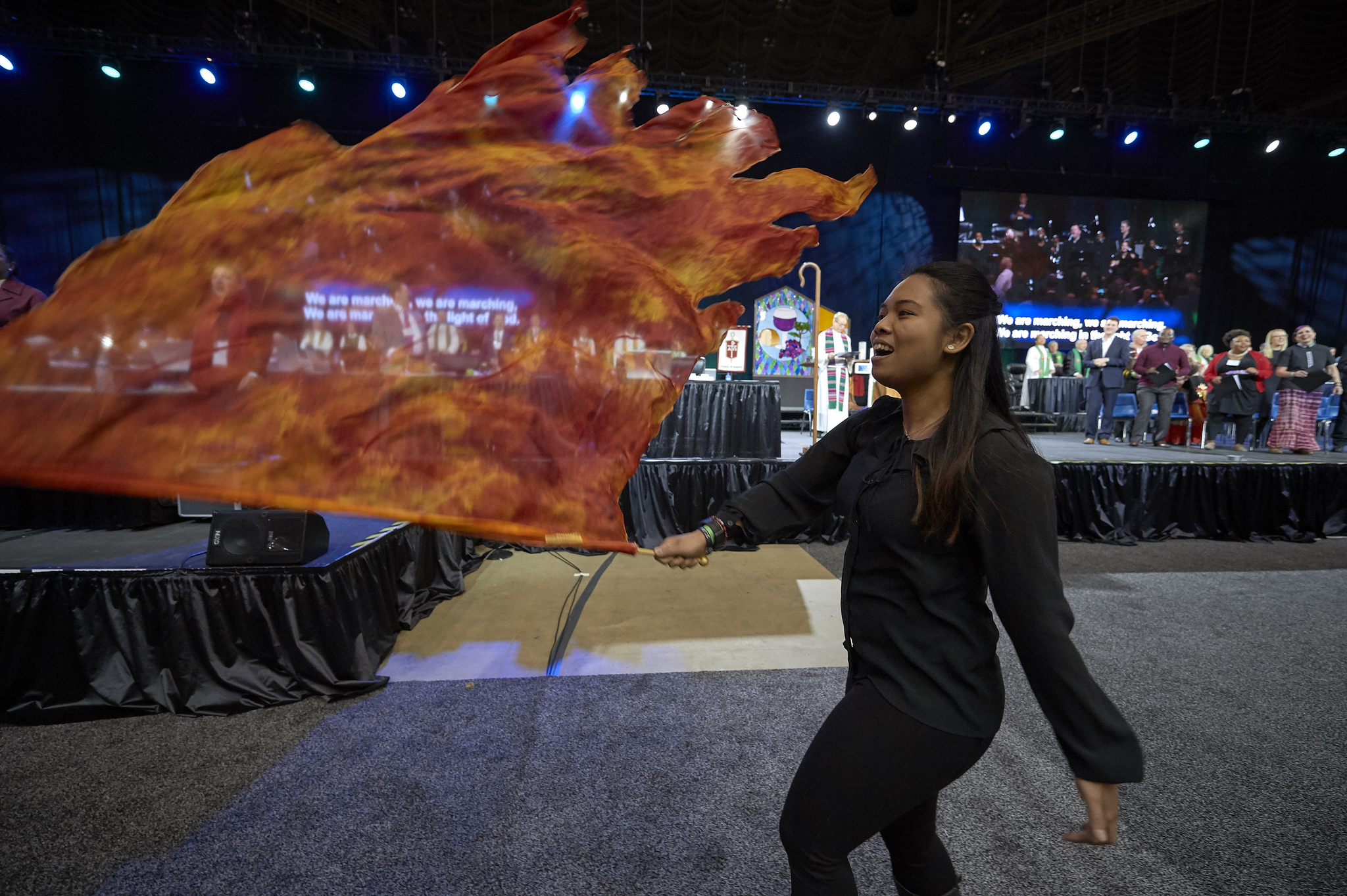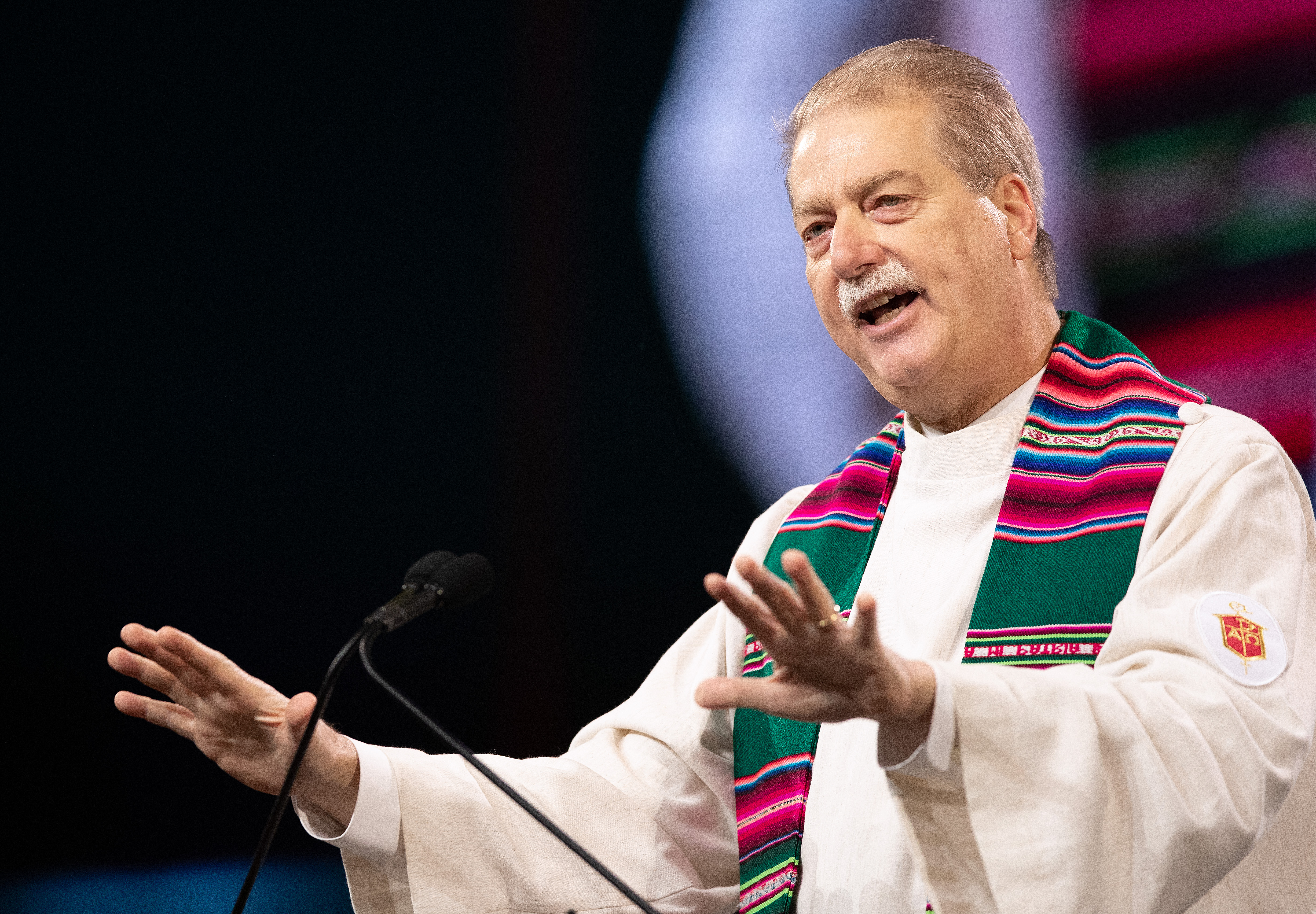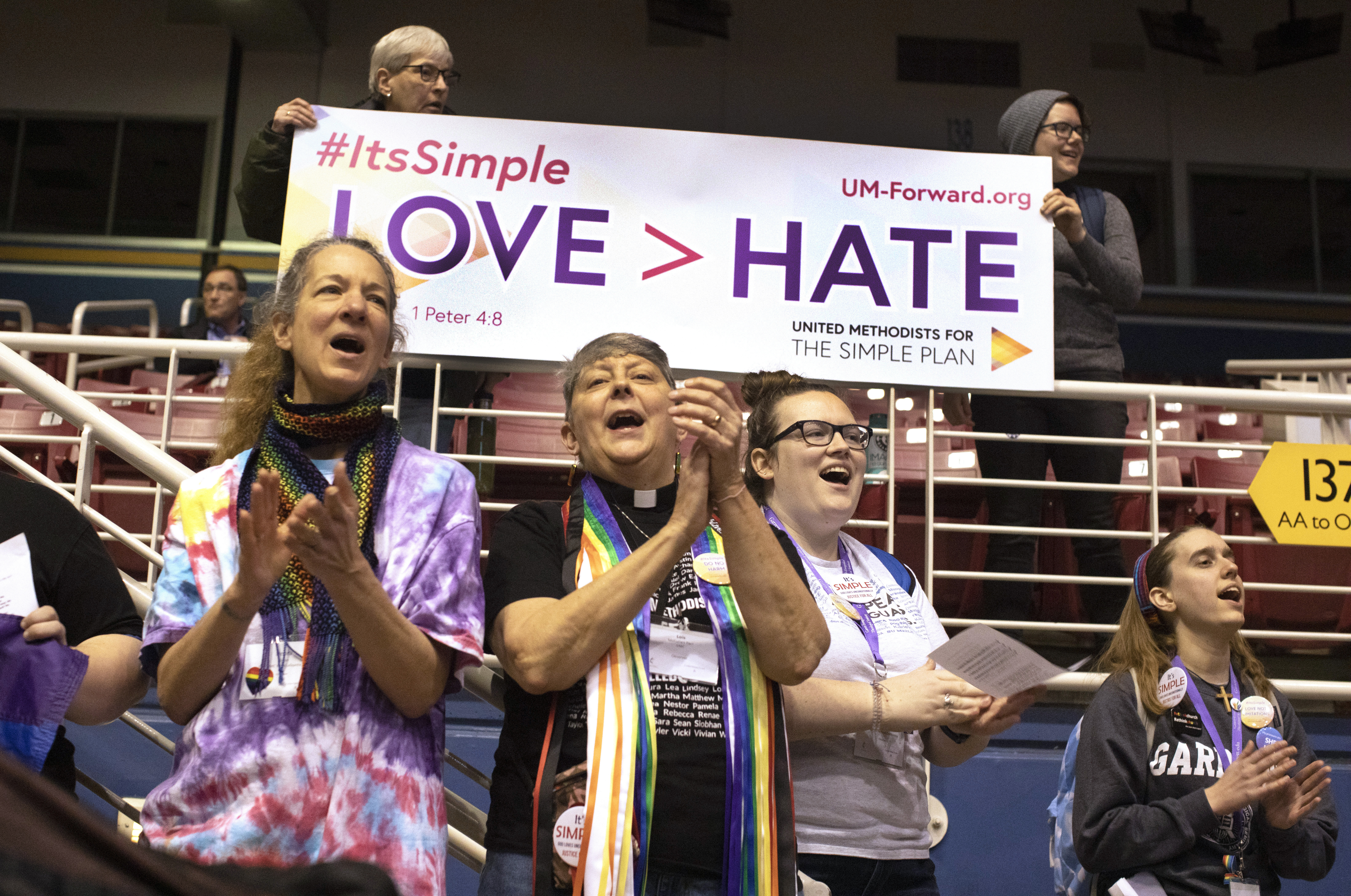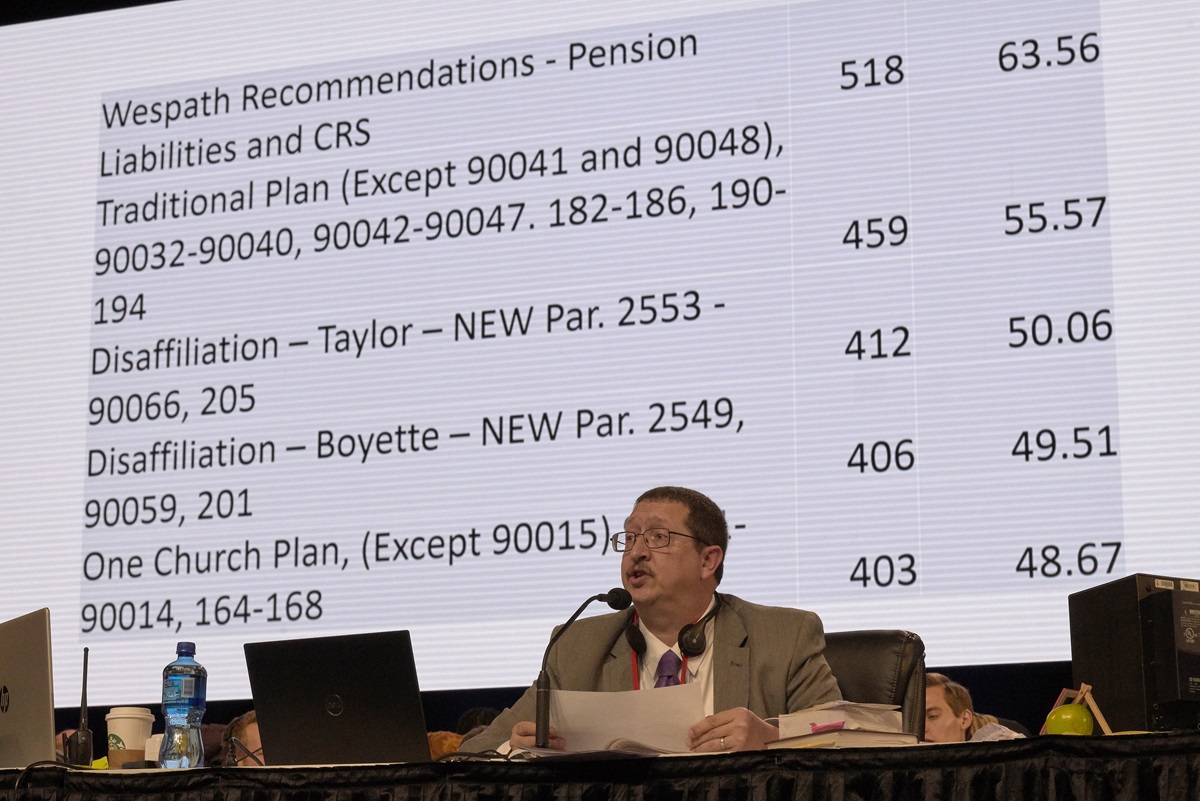Editor’s note: This edits and consolidates a longer version of this story that was published earlier on Feb. 24.
Petitions meant to address pensions and the Traditional Plan topped the list of priorities for what General Conference delegates will work on in their legislative committee.
This was a key vote as delegates to the denomination’s top lawmaking assembly try to set the direction in The United Methodist Church’s longtime debate over homosexuality.
By 56 votes, the Traditional Plan topped the One Church Plan, supported by a majority of the bishops.

The vote started mid-afternoon of a day that began with a sermon by Bishop Kenneth H. Carter in which he asked delegates to make every effort to make unity “your passionate concern.”
Following worship, delegates heard the presentation of the Commission on a Way Forward’s report.
The priority voting took about an hour and the results were announced by the Rev. Gary Graves, secretary of the General Conference Commission. The totals showed that the Traditional Plan was second behind pensions, and the One Church Plan was fifth behind legislation that deals with disaffiliating churches.
The Traditional Plan would strengthen restrictions against officiating at same-gender unions and being “self-avowed practicing” gay clergy. The One Church Plan would leave questions of same-sex weddings up to individual clergy and congregations.
“We’re very happy the Traditional Plan received the majority of the votes,” said the Rev. Rob Renfroe, president of the unofficial advocacy group Good News, which has championed the legislation.
“In spite of all the efforts of the groups and the bishops, the church remains committed to a scriptural understanding of sexual ethics.”

Bishop Carter said the Feb. 24 vote is “very early in the process” and the work is in the hands of the delegates.
“The Commission on the General Conference was wise in developing a process for this special session: We are a church on four continents, we speak multiple languages and we live in diverse cultures. And we bring all of this to the complex relationships between LGBTQ identity, the unity of the church and our interpretation of scripture. The prioritization process helps us to focus,” Carter, who also leads the Florida Conference, said.
“I don’t think it is appropriate to comment on how the delegates are voting. Bishops have been clear that we are serving the delegations to do their best work …,” he said. “I respect the delegates; the church has authorized them to do this important work.”
Moving forward, he said the delegates will begin to reflect on this work, and this will take legislative form over the next two days.
Bishop Julius C. Trimble, who leads the Indiana Conference, said his word to his people is: “Hold on and keep doing ministry the way you're doing now.
“There's more to come. Let's not put a period on it yet.”
During the priority process, delegates ranked legislation either as high or low priority. Some of the 23 legislative packages involve multiple petitions; others were petitions that can stand alone. Each petition changes part of the Book of Discipline, the denomination’s governing document.
The rankings were displayed after all the plans and petitions had received a vote. More than 820 of 864 delegates from around the world were voting.
Legislation recommended by Wespath Benefits and Investments, the denomination’s pension agency, topped the final tally with 518 high-priority votes.
Those two petitions deal with how to handle the pension liabilities of departing churches and the accrued benefits of departing clergy.
The Traditional Plan received 459 votes.
The next highest vote getters were two different plans for how exiting congregations could leave with their property, with 412 and 406 votes respectively.
The One Church Plan received 403 high-priority votes.
The Simple Plan, which would eliminate all restrictive Disciplinary language related to homosexuality, received 153 high-priority votes.
The Connectional Conference Plan, which would restructure the church around theological lines, drew 102 votes.

Before voting even began, delegates learned that the two petitions that are part of the Modified Traditional Plan would first go to the Standing Committee on Central Conference Matters. The permanent committee of General Conference deals with legislation that affects central conferences — church regions in Africa, the Philippines and Europe.
Neil Alexander said his unofficial advocacy group Uniting Methodists, which supports the One Church Plan, is not giving up.
“We are in the beginning of a complex legislative process,” Alexander said. “There is much debate and many decisions to come. We will be sharing information and ideas we believe will win broad support.”
The Rev. Edwin Momog, a delegate from Sierra Leone, said the hall was charged and tense during the vote. But he believes a majority of delegates are happy.
“But God has a way of doing things. He has some sense of humor. When we feel so much anxious, that’s when he comes in with his own way. It is God’s church. And, I think the voting just went God’s own way.”
Audun Westad, lay delegate from the Norway Conference, said it saddened him that the disaffiliation petitions got such huge support.
“That does not look good for their willingness to stay together with people of a different mind,” he said.
The German delegation was surprised that the plan was ranked so low with less than 50 percent of the vote, said Klaus U. Ruof, German communicator. They likewise were surprised the delegates wanted to talk pensions and money before talking about a plan, he said.
The Rev. Alex da Silva Souto, an openly gay clergy delegate from the New York Conference, was less surprised. He has championed the Simple Plan.
“Today’s results are not the first time we as LGBTQIA United Methodists have been hurt by our church, and not the first time that our denomination contradicts its mission, and still we are here,” he said. “We will continue to trust in God's priorities for our welfare.”
After the prioritization votes, delegates elected officers for the single legislative committee: The Rev. Joe Harris, Oklahoma, chair; the Rev. Betty Kazadi Musau, North Katanga, vice chair; Carlene Fogle-Miller, Florida, secretary.
The Book of Discipline requires that all petitions receive a vote in a legislative committee.
Usually General Conference has multiple such committees, but because the whole gathering is dealing with the same parts of the Book of Discipline, there is only one committee with all delegates. The legislative work will continue on Feb. 25.
In the legislative committee’s first vote, delegates passed Wespath’s petition 768 to 44, moving it on to the plenary session.
Concerns about being so close to their scheduled adjournment led delegates to vote to adjourn early and take up discussion on the Traditional Plan first thing tomorrow.
Bishop Carter, who was one of three moderators for the Commission on a Way Forward, said in his sermon that his work with the commission was not unlike his 28 years as pastor of local churches. The commission was charged with finding ways to resolve the divisions over the church’s stance on homosexuality.
When people disagree about how to interpret Scripture, “they imagined they were still learning and growing as disciples and had not arrived,” Carter said. “The divisions are easy to see. What would it be like for us to watch and listen for the connections?”
The story was compiled by United Methodist News Service staff and will be updated with additional developments throughout the day. Contact them at (615) 742-5470 or [email protected]. To read more United Methodist news, subscribe to the free Daily or Weekly Digests.
Like what you're reading? Support the ministry of UM News! Your support ensures the latest denominational news, dynamic stories and informative articles will continue to connect our global community. Make a tax-deductible donation at ResourceUMC.org/GiveUMCom.




